If you’re a WordPress user looking to optimize your website for search engines, chances are you’ve heard of the popular SEO plugins All in One SEO and Yoast.
Both plugins offer a range of features to help you improve your website’s ranking on Google and other search engines but choosing one might be confusing. In this article, we’ll compare All in One SEO vs Yoast and help you decide which plugin can better fit the requirements of your website.
Ready to dive into the battle?
Let’s get started!
In This Article
Yoast SEO vs All In One SEO feature comparison battle
Both All in One SEO and Yoast SEO are highly popular WordPress plugins that offer a range of features to optimize your website for search engines. If you’re pressed for time, here’s a brief comparison between All in One SEO and Yoast. However, we highly recommend reading the full article for a more comprehensive analysis. Here’s a summary to help you get an overview.
| Aspect/Feature | All in One SEO | Yoast SEO | Winner |
| Pricing | Offers affordable pricing and more features for the price | Offers a free version with limited features and a more expensive premium version | All in One SEO |
| Meta Tags | Offers dynamic tags in title and description, supports Open Graph and Twitter Cards | Offers similar meta tags features | Tie |
| Keyword and Content Analysis | Provides more comprehensive and detailed suggestions for individual pages and posts | Provides lesser detailed and optimized suggestions | All in One SEO |
| Technical SEO | Offers a range of technical SEO features, including XML sitemap generation and robots.txt editing | Offers similar technical SEO features but lesser-comprehensive | All in One SEO |
| Link Management | Offers a built-in link management tool | Offers a similar link management tool but with limited functionalities | All in One SEO |
| Tracking and Analytics | Supports Google Analytics and offers basic tracking and analytics features with more control over your analytics data. | Offers similar tracking and analytics features, but there are limited functionalities | All in One SEO |
| Integrations | Offers integrations with popular third-party services like WooCommerce and ACF | Offers similar third-party integrations | Tie |
As you have seen the comparison table above, now let’s delve deeper into each feature of All in One SEO vs Yoast. In this section, we will analyze and compare the two plugins in various areas, providing you with valuable insights that can help you make an informed decision about which one is the best fit for your needs.
Related Articles
Pricing
Pricing is an important factor to consider when it comes to choosing the right SEO plugin for your WordPress website. Let’s take a closer look at the necessary details.
Free version price
In the debate between Yoast vs All in One SEO, both plugins have free versions for beginners. All in One SEO’s free version suits hobby sites or small businesses. But for more advanced features, Yoast SEO’s paid versions may be a better fit, providing multiple focus keywords and other extras not found in All in One SEO’s paid packages.
Premium price
All in One SEO pricing structure comes in four paid plans: basic, plus, pro, and elite. The basic plan costs $49.60/year and is suitable for one website. The Plus plan costs $99.60/year and can be used on up to three sites.
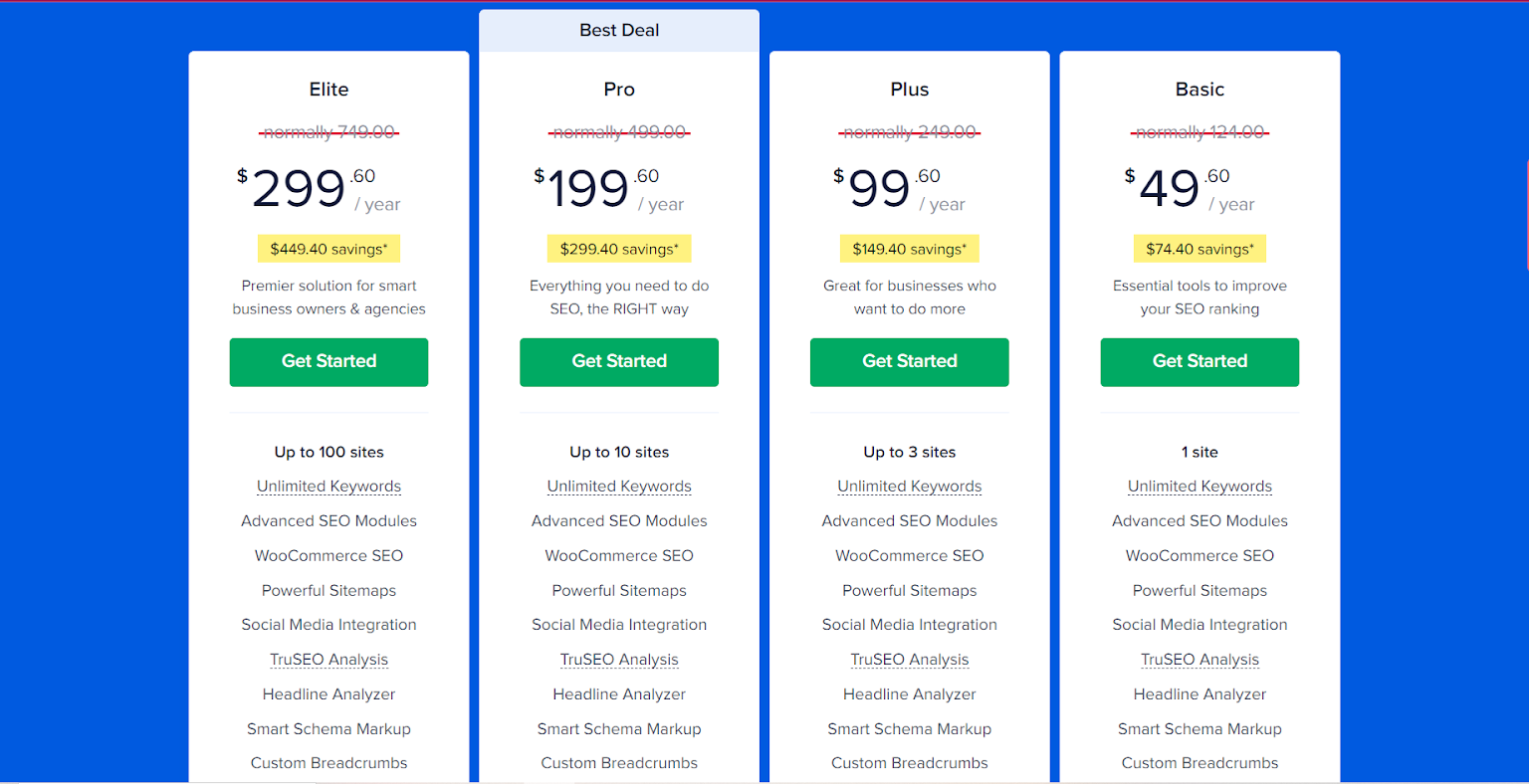
The pro plan costs $199.60/year and is designed for up to ten sites, while the elite plan costs $299.60/year and can be used on up to 100 sites.
On the other hand, Yoast pricing also offers several options. Yoast SEO Premium offers two pricing plans. The Yoast SEO Premium plugin costs $99/year (ex. VAT), while the Plugin subscription costs $229/year (ex. VAT).
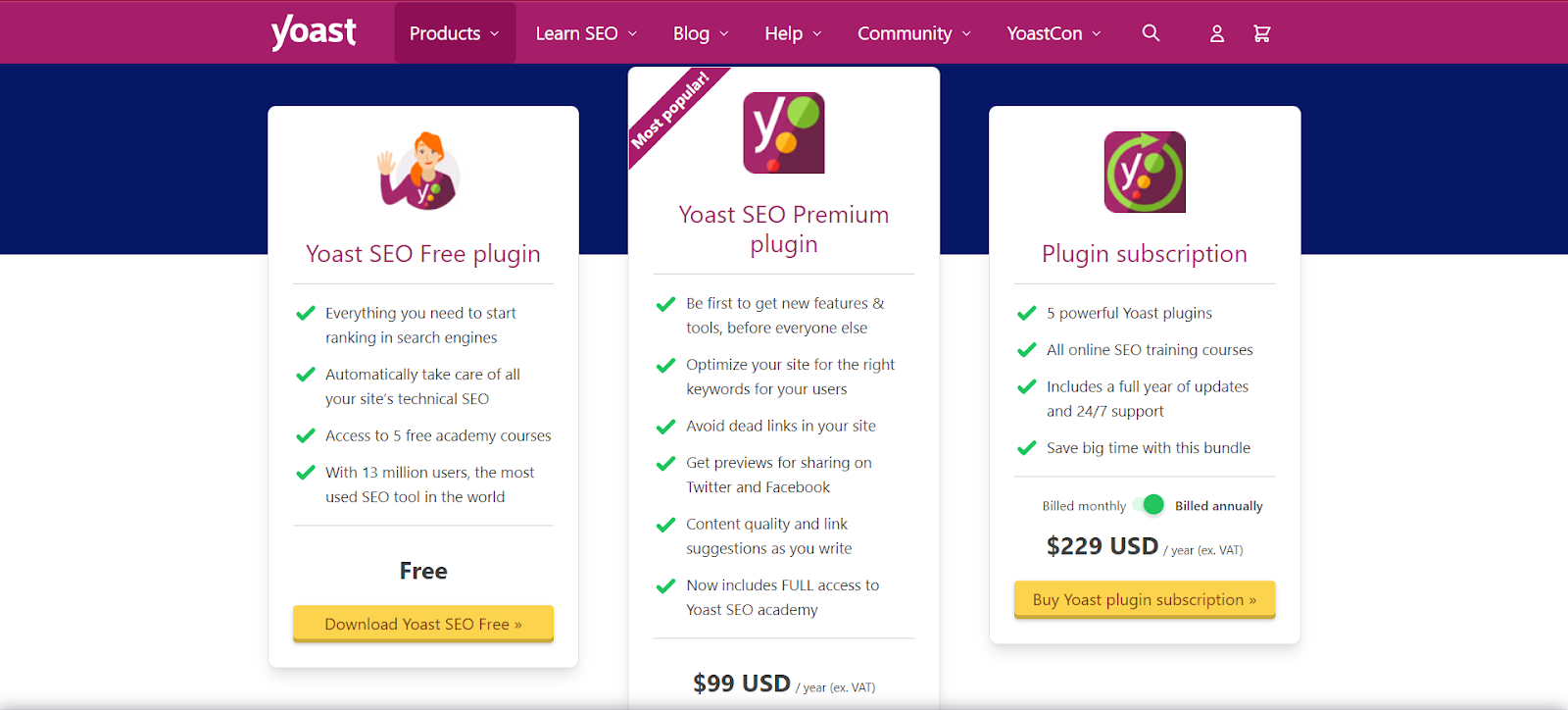
When it comes to comparing Yoast SEO vs All in One SEO, the Premium plugin subscription for Yoast SEO offers a wide range of features such as helpful suggestions for content quality and links, previews for sharing on social media, and a lot more.
Winner: All in One SEO
Meta tags
When it comes to choosing between All in One SEO Pack vs Yoast SEO, it’s important to look at their respective meta tag functionalities. Here’s a comparison of some of the key features they offer related to meta tags:
Title and meta description
All in One SEO offers automatic SEO generation, and dynamic SEO smart tags, which automatically generate keywords based on the page’s content or post.
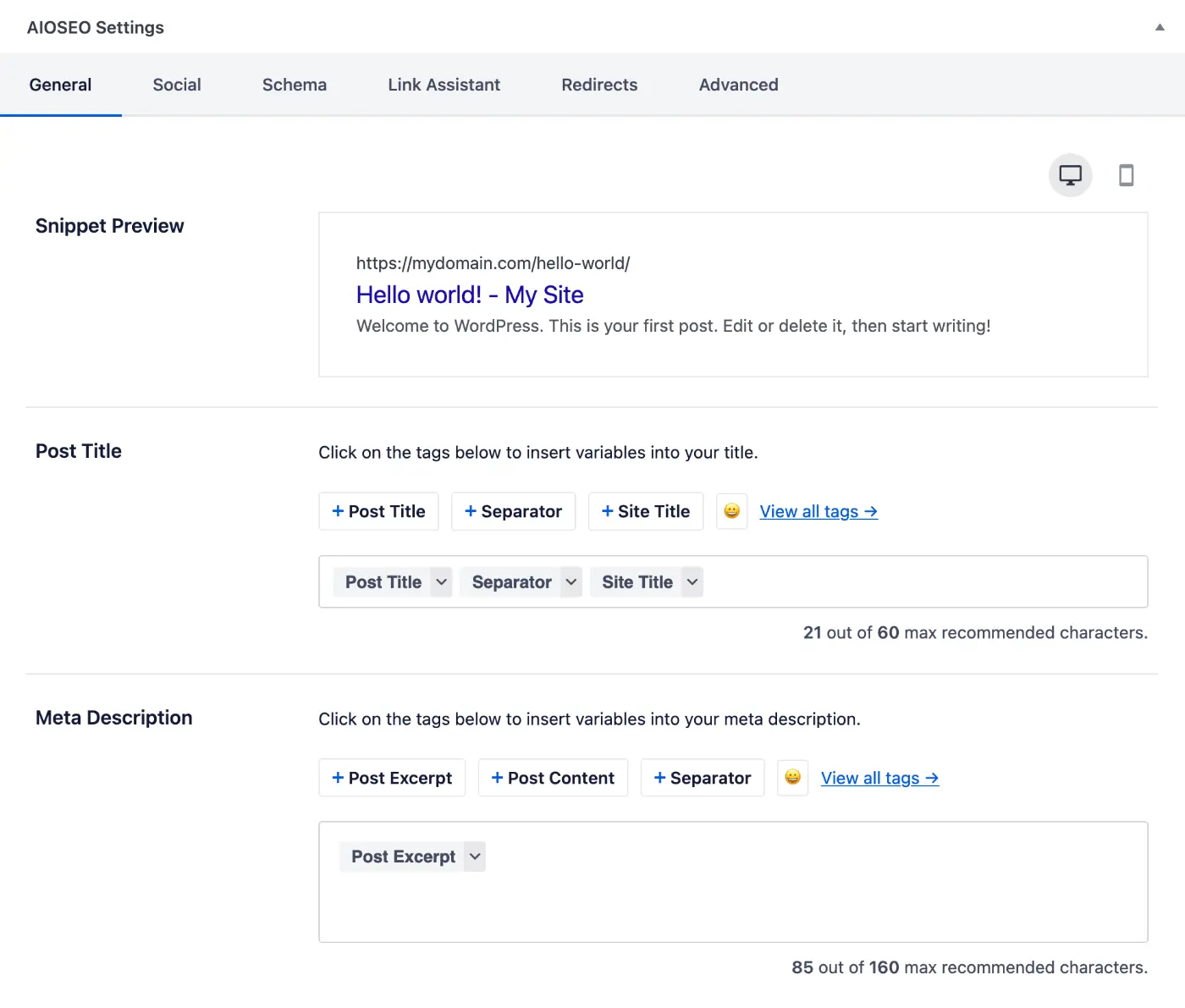
Additionally, All in One SEO allows users to manually customize the title and meta descriptions for each page or post.
But if we come back to our comparison of All in One SEO vs Yoast, Yoast offers title and meta description templating, which allows users to create a snippet appearance in the search results.
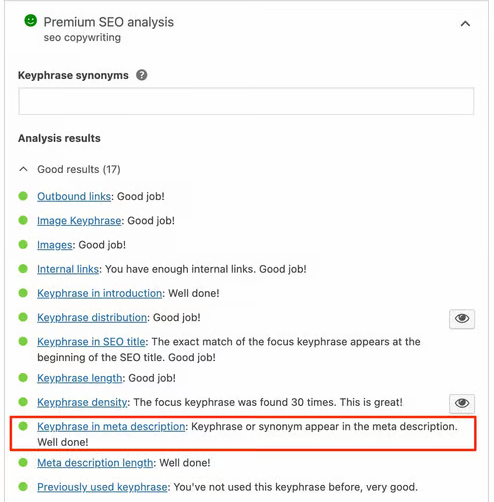
Users can customize the title and description for each page or post, and Yoast SEO offers real-time previews of how the snippet will look in the search results.
Overall, in our battle of All in One SEO vs Yoast, it can be said that both plugins offer useful functionalities for optimizing titles and meta descriptions depending on their requirements but All in One SEO’s automatic SEO generation and dynamic smart tags shine out.
MetaData import and export
In terms of importing settings and metadata, All in One SEO stands out with its straightforward process.
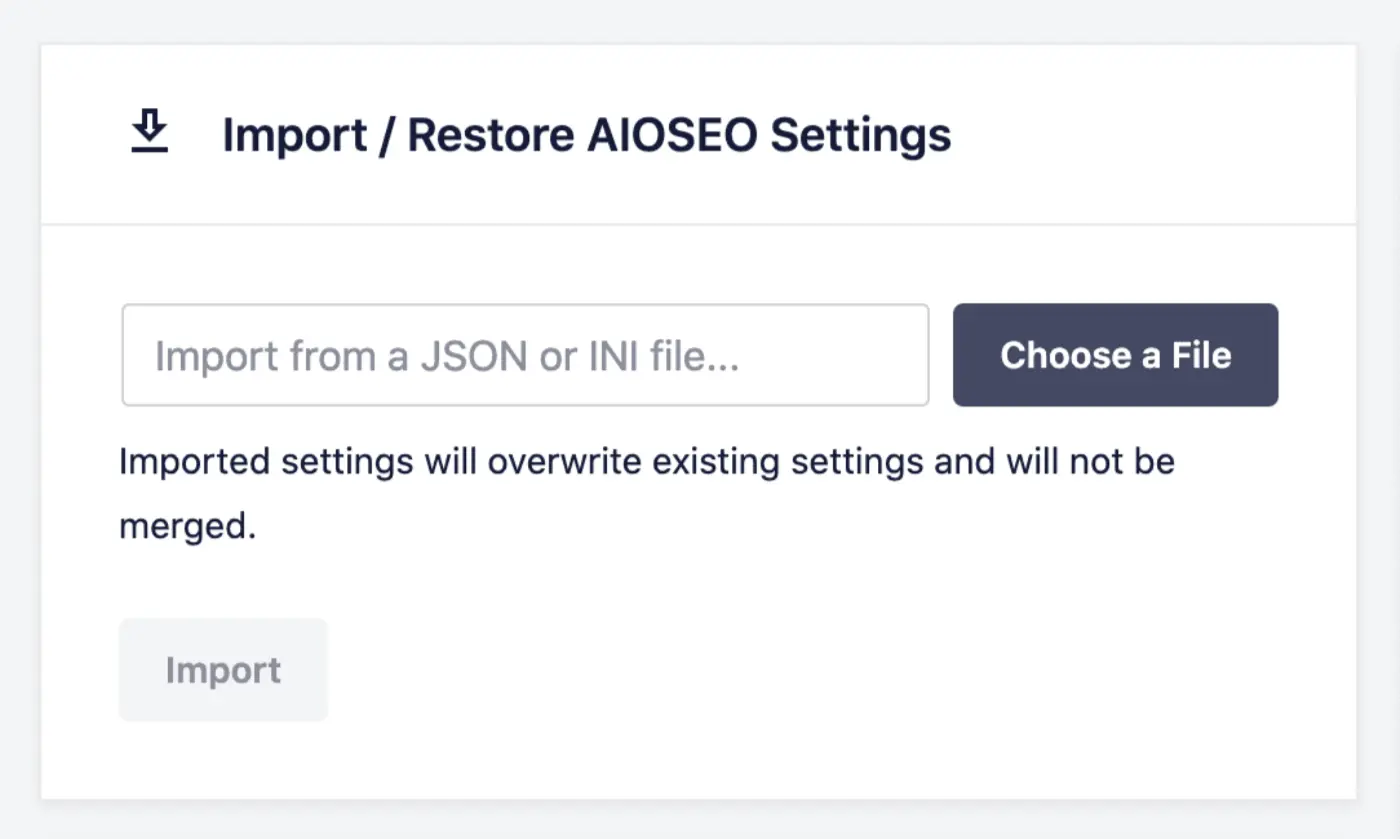
Yoast SEO offers similar functionality, Yoast bulk editor that lets you export and import your SEO data, including SEO titles, meta descriptions, and focused keyphrases. This feature is available in both the free and premium versions of the plugin.
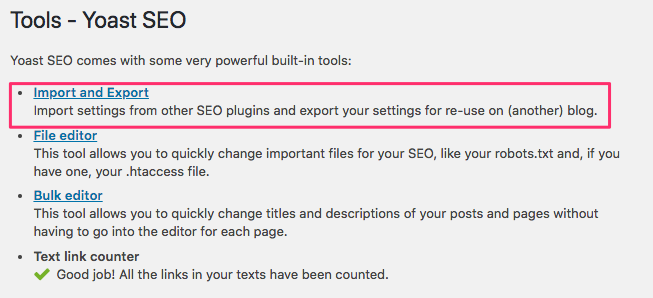
Auto-generation of meta tags
All in One SEO automatically generates meta descriptions for your content based on the Meta Description settings. This is helpful for those with limited time or resources. Yoast provides a more customizable approach to auto-generating meta tags and can be a great time-saver for those managing larger websites.
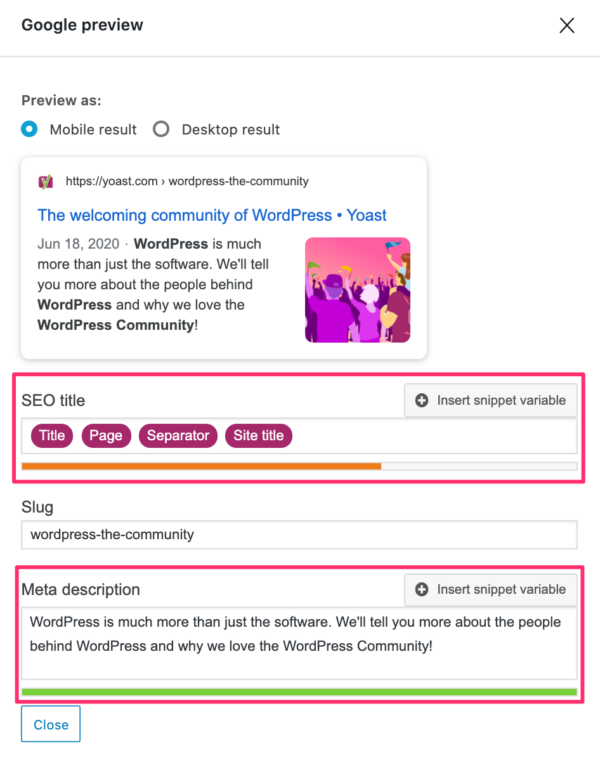
Social media tags / Open Graph
When it comes to optimizing your website for social media, both All in One SEO and Yoast have got you covered with their respective features. With All in One SEO’s Pack Pro WordPress SEO plugin, you can easily manage your All in One SEO Open Graph and Twitter Card metadata for social media shares.
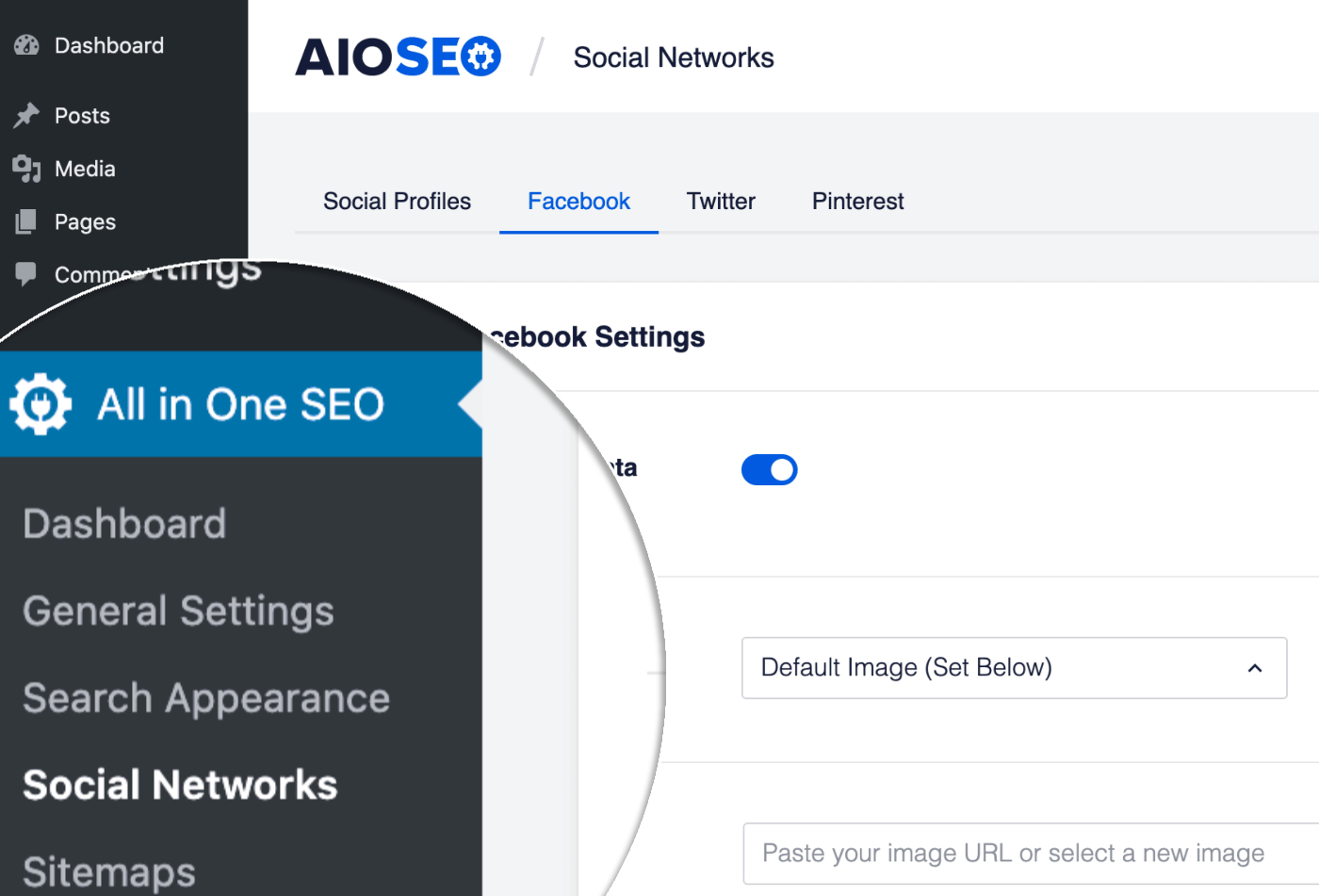
Similarly, Yoast Open Graph offers a preview feature for its Premium users, providing full control over how your posts look on Facebook and Twitter.

Winner: It’s a Tie!
Keyword and content analysis
One of the most important aspects of on-page optimization is analyzing both keywords and content. In this section, we’ll be comparing the two popular tools that help with this task.
Multiple focus keywords analysis
All in One SEO Pro allows you to optimize your content for multiple keyphrases, which can help you rank higher in search engine results.
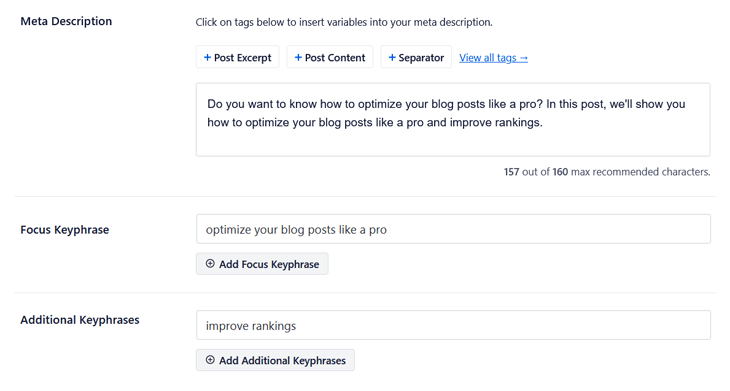
With this feature, you can easily add multiple keyphrases to your content and follow SEO best practices for each keyphrase.
On the other hand, Yoast SEO‘s multiple focus keywords analysis feature is available only to premium users. This feature lets you optimize your content for multiple keyphrases, variations, synonyms, and more in order to reach a larger audience.
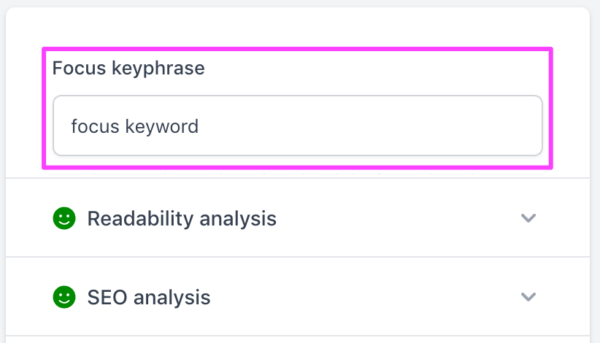
With Yoast SEO Premium, you can also check the optimization of each keyword, including the keyword density and placement, to improve your chances of ranking higher in search engine results.
Content analyzer
All in One SEO offers a premium Content Analyzer feature that helps you optimize your pages for unlimited SEO keywords. On the other hand, Yoast’s free version also includes a content analysis tool that analyzes your content for SEO factors. However, it does not provide recommendations for improving your content, which needs Yoast SEO Premium access.
Duplicate content detection
All in One SEO also has a feature that can help you detect duplicate content on your website. It scans your site for any duplicate content and flags it for you, making it easy to fix the issue and improve your SEO.
Yoast SEO, on the other hand, includes checks that tell you when you’re using a duplicate keyphrase and when your link texts are the same as your keyphrase. This helps prevent keyphrase cannibalization, which can negatively impact your SEO efforts.
Winner: All in One SEO
Both plugins make it convenient to analyze content, but, All in One SEO stands out as it offers a more actionable plan for optimization.
Technical SEO
Technical SEO can seem like a daunting task, but it’s a vital component of any successful SEO strategy. Let’s now look at two popular technical SEO tools and discuss how they can help you optimize your website for search engines.
XML sitemap
All in One SEO sitemap is easy to set up, which helps search engines discover and crawl your pages more efficiently. The sitemap is enabled by default and requires very little configuration.
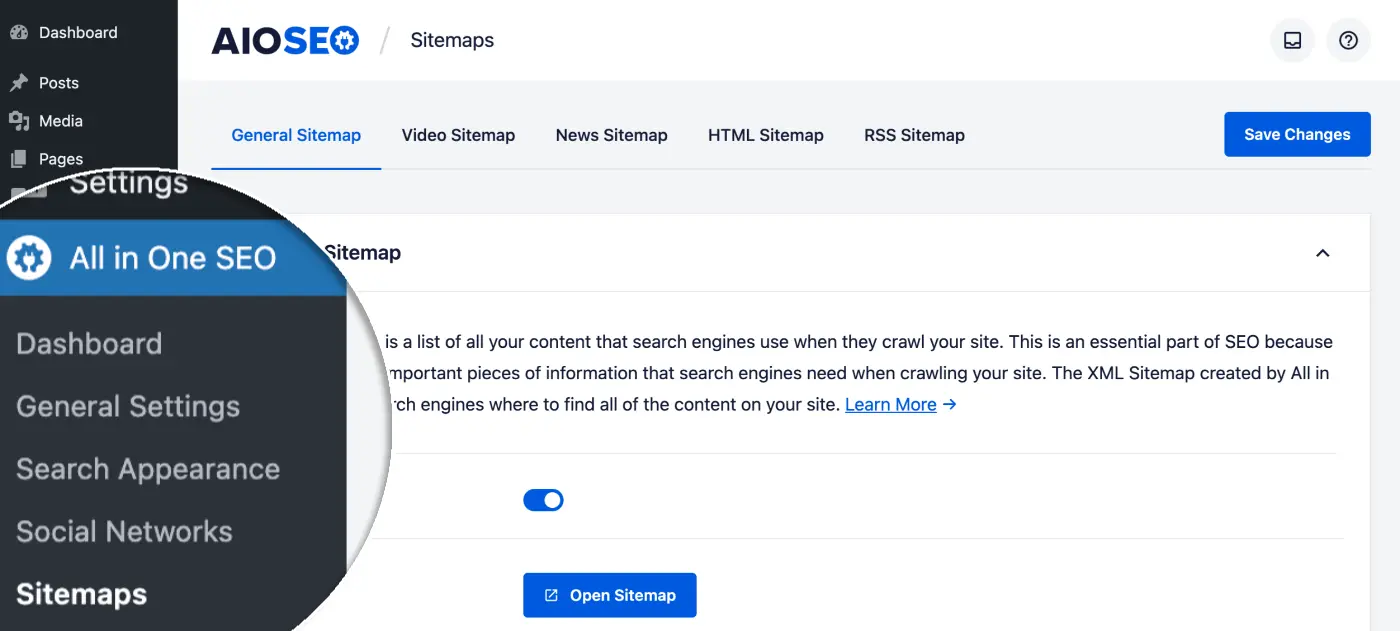
Once set up, the sitemap is automatically updated whenever you publish or change content on your site, ensuring that search engines are always aware of the latest updates to your website.
On the other hand, Yoast SEO also provides an XML sitemap feature, which includes a Yoast sitemap index and individual sitemaps that are automatically updated as you add or remove content from your website.
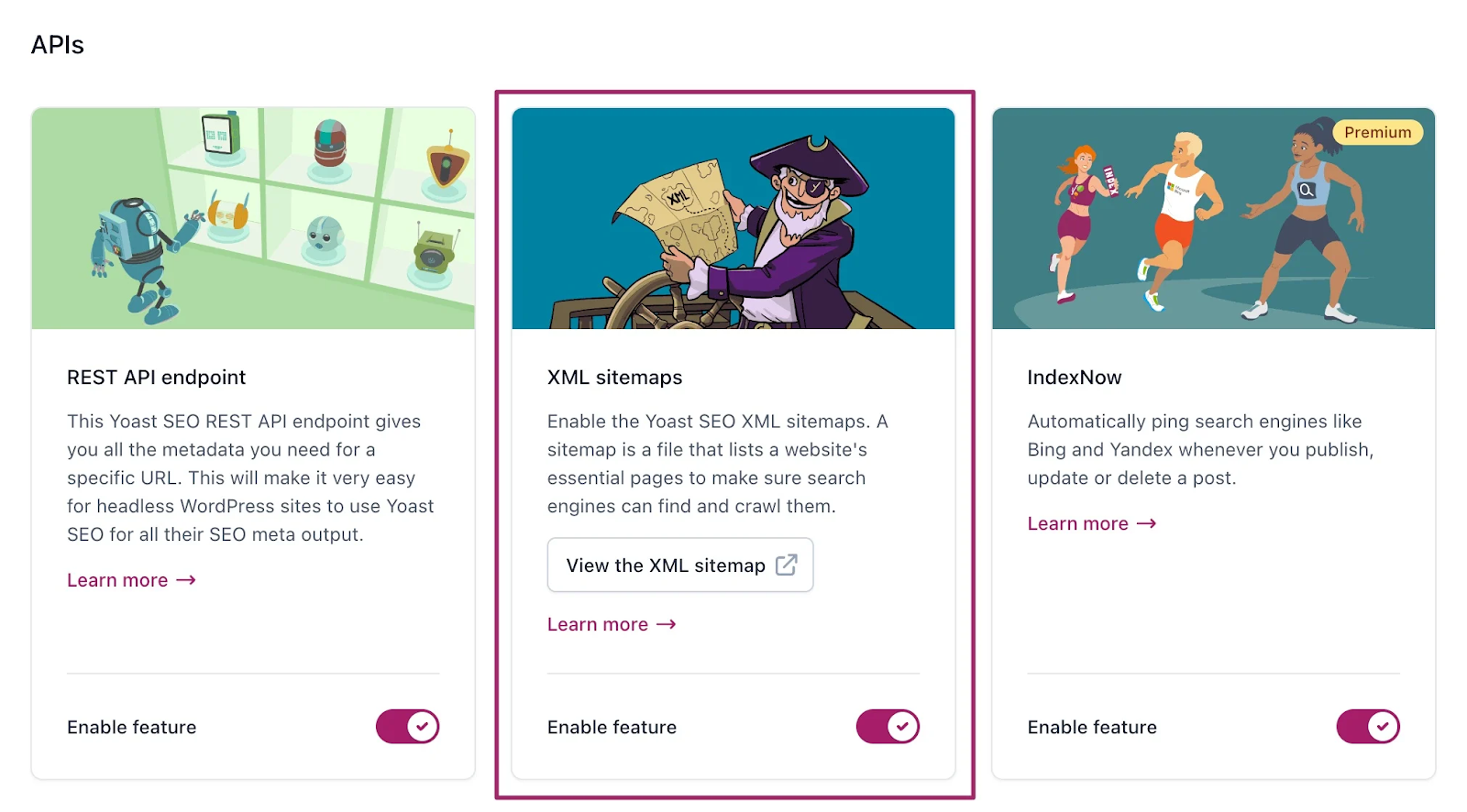
Diverse structured data/schema
All in One SEO Schema feature offers a comprehensive set of structured data tools that allow you to provide Google with properly formatted markup.
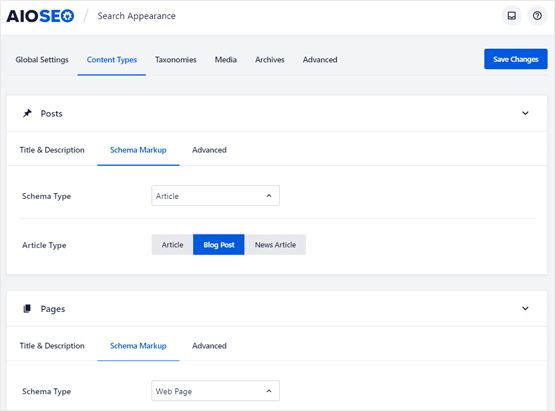
With All in One SEO, you can easily set up schema markup for your website and ensure it is properly formatted to meet Google’s guidelines. This includes local SEO schema markup, which is essential if you want your business to appear in local searches and Google Maps.
On the other hand, Yoast SEO offers an automatic structured data feature that helps search engines understand the content on your pages, making it easier for them to display rich results in their search listings.
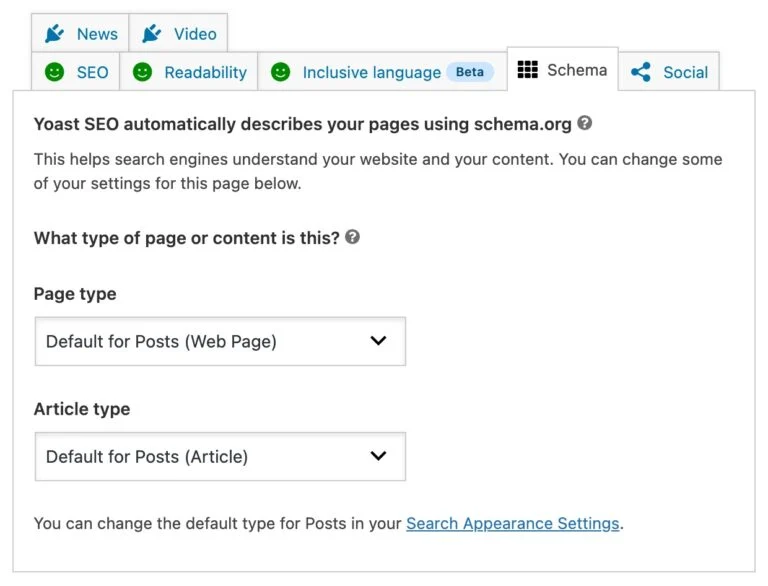
In addition, Yoast SEO’s Schema tab allows you to easily set the type of content you have on your pages, including articles, recipes, products, and more. Overall, both All in One SEO and Yoast offer powerful structured data tools that can help improve your website’s visibility in search results. It’s important to consider your specific needs and goals when deciding which plugin is right for you.
Robots.txt and .htaccess file editing
When it comes to managing the robots.txt and .htaccess files in WordPress, both plugins offer powerful tools to help you control your website’s search engine visibility. With All in One SEO robots.txt, you can easily manage the file that WordPress generates, giving you greater control over the instructions you give to web crawlers about your site.
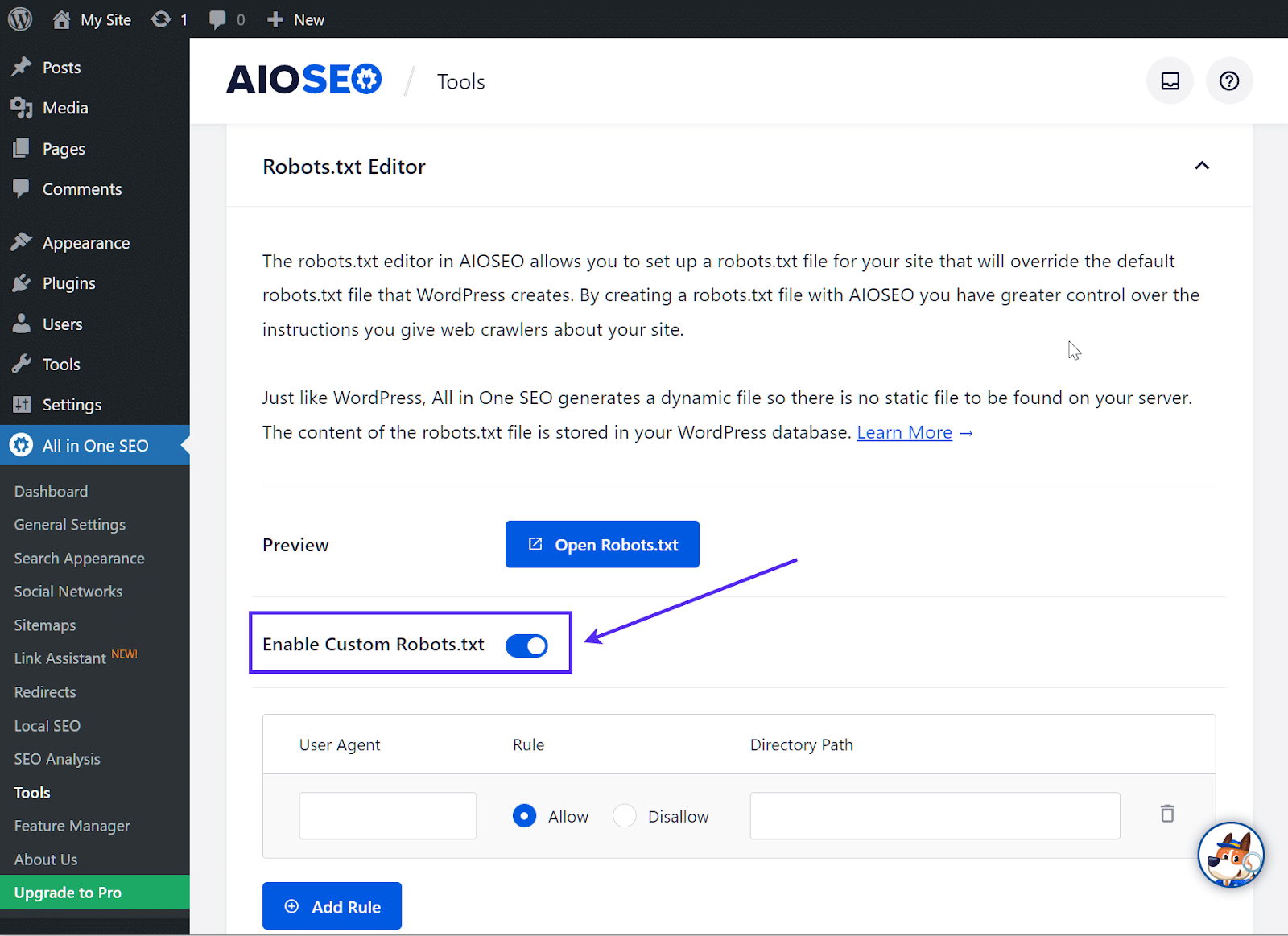
This feature allows you to exclude certain pages or directories from being indexed by search engines, or even prevent specific user agents from accessing your site altogether.
On the other hand, Yoast SEO provides an easy way to create or edit the Yoast robots.txt file directly from the WordPress dashboard. This allows you to quickly and easily update your website’s instructions for search engine crawlers without having to leave the WordPress admin area.
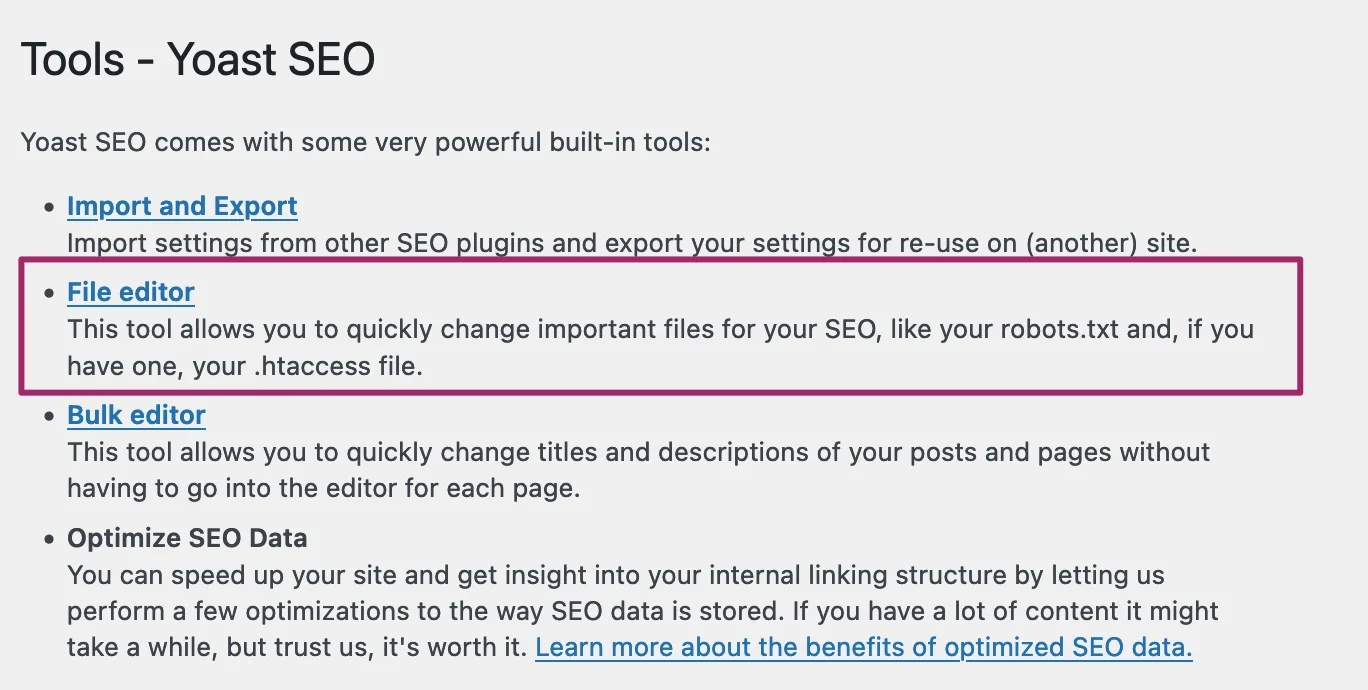
Yoast SEO also includes a feature that lets you preview your robots.txt file to ensure that it is working correctly. Overall, both plugins offer tools for editing the .htaccess file, which is another important file that controls how search engines interact with your site. These features allow you to customize your website’s settings even further, giving you greater control over your search engine optimization efforts.
Site audit
When it comes to site audit features, All in One SEO offers a comprehensive analysis of your website’s SEO in just a few seconds. It provides detailed explanations of any critical errors found, along with resources to help you fix them yourself.
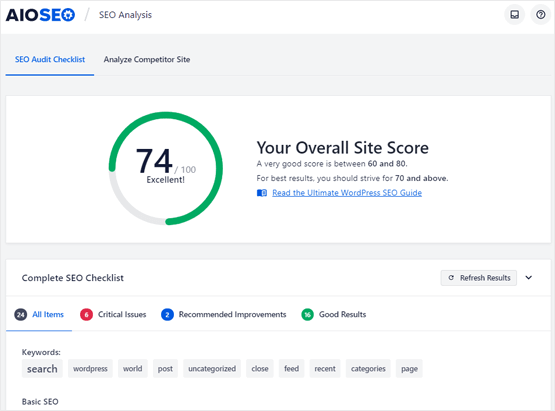
With All in One SEO, you can also analyze your site speed and receive specific recommendations on how to improve it.
On the other hand, Yoast’s free tool, Yoast SEO analysis, provides a basic site audit. However, the real power of Yoast comes with its premium version, which includes an expanded and smarter SEO analysis.
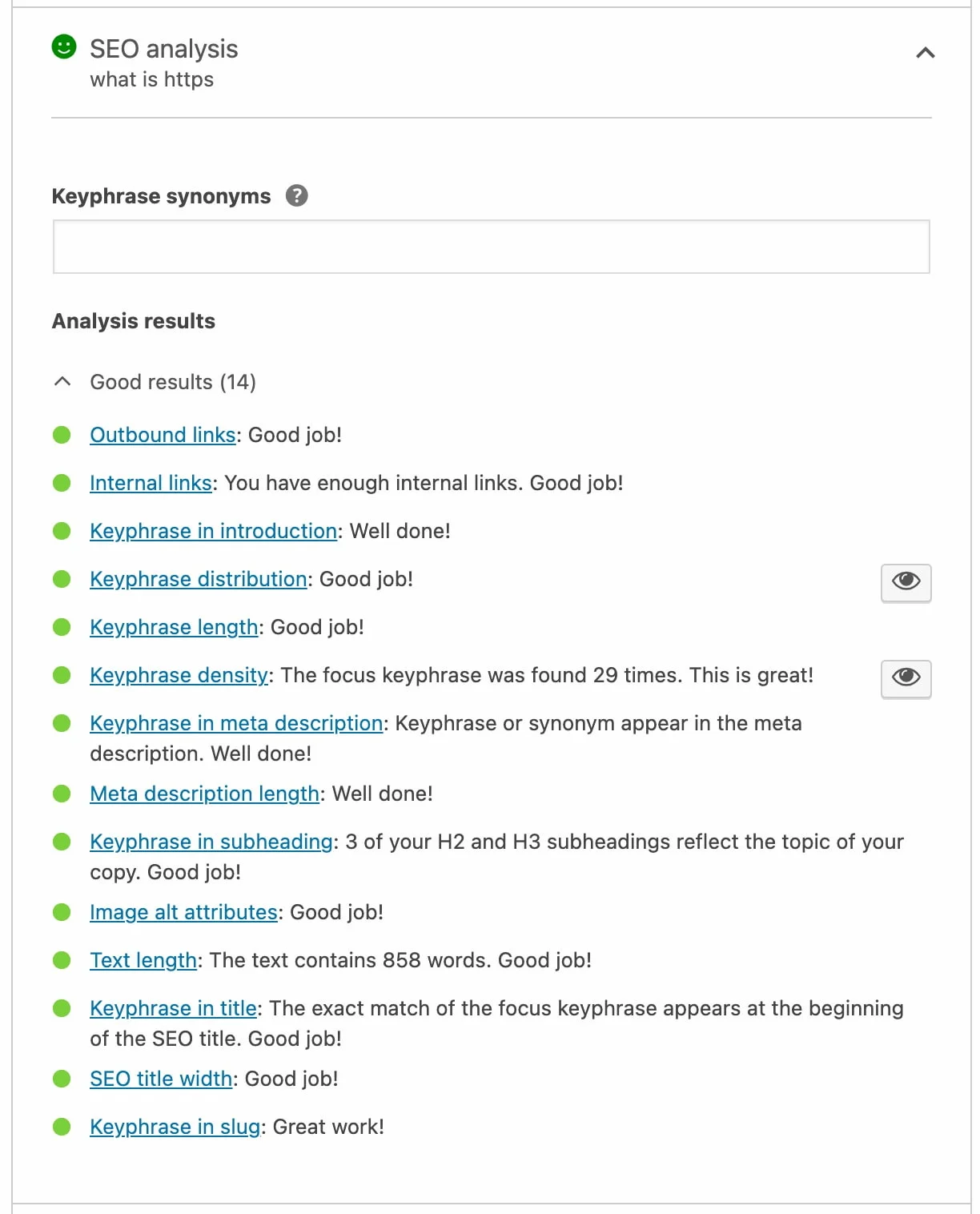
One of the core features of Yoast SEO is its SEO analysis, which checks your content against SEO best practices and provides feedback in the form of green, orange, and red bullets. With Yoast SEO Premium, you have all the tools you need to improve the visibility of your content and boost your search engine rankings.
Winner: All in One SEO
Both plugins make it convenient to analyze content, but, All in One SEO stands out as it offers a more actionable plan for optimization.
Link management
Properly managing your website’s links can help improve your search engine rankings and drive more traffic to your site. Let’s dive in and see how these two stack up against each other!
Internal link manager
All in One SEO comes with Link Assistant, which allows you to create better internal links on your WordPress website by crawling the links and providing a detailed report.
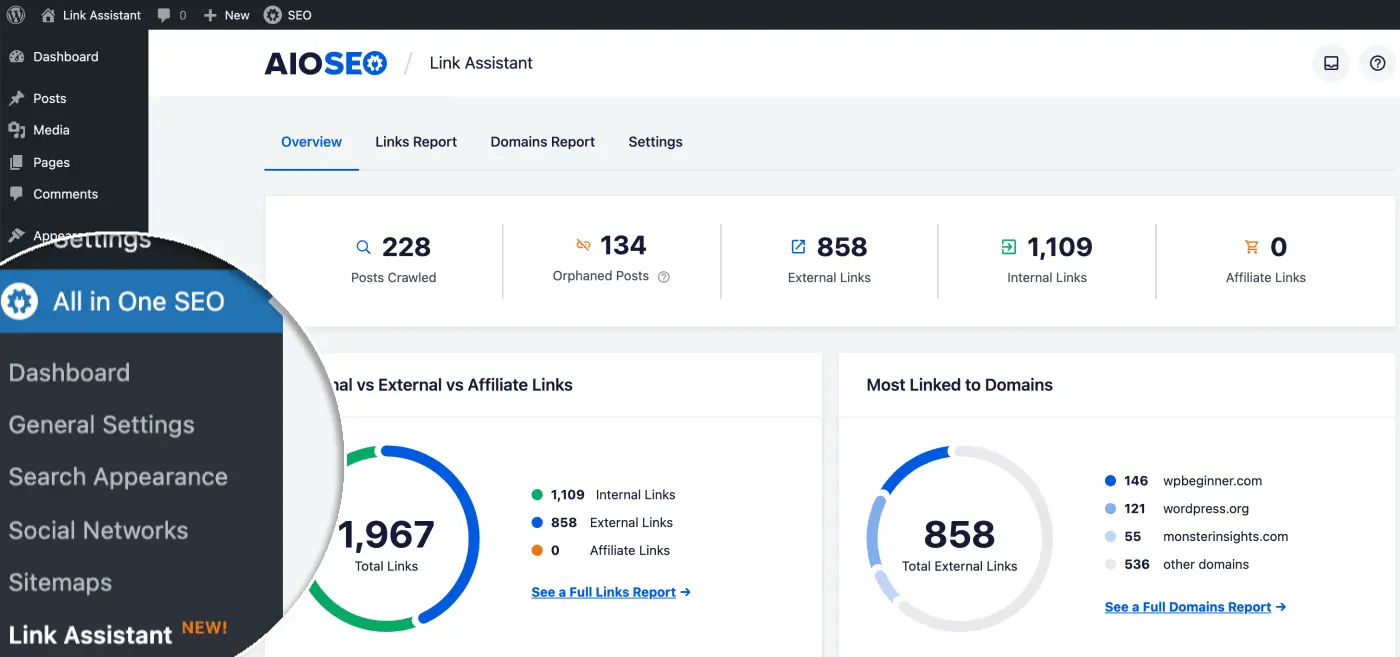
With this, you can view the number of internal links, outbound links, and affiliate links for each post or page.
The Yoast SEO plugin, on the other hand, comes with a basic internal linking tool accessible only to premium users.
It also scans your content for Yoast internal linking and provides suggestions for improving them but it is not as comprehensive as the All in One SEO link assistant.
Redirection manager
Both All in One SEO and Yoast SEO Premium have a redirection manager functionality that allows you to manage redirects on your WordPress site. All in One SEO’s free version includes 301 redirects, 404 error tracking, and the ability to redirect multiple URLs to the same destination URL, along with a complete log of all redirects and 404s on your site.
Yoast SEO Premium also includes a built-in redirection manager that lets you redirect pages to another location on your site and automates the process for existing content. Yoast SEO redirect also lets you create a redirect when you change the URL of a post or page and notifies you to create a redirect when you delete one. Overall, both plugins offer similar features with slightly different approaches to managing and automating redirects.
Editable canonical URL
An editable canonical URL is a feature in SEO plugins that lets you specify the preferred URL for a page or post, which search engines should treat as the main or authoritative version, improving your site’s SEO.
In All in One SEO, you can specify your own canonical URL by editing your content and scrolling down to the AIOSEO Settings section. It also lets you remove the page numbers from paginated content’s Canonical URLs. 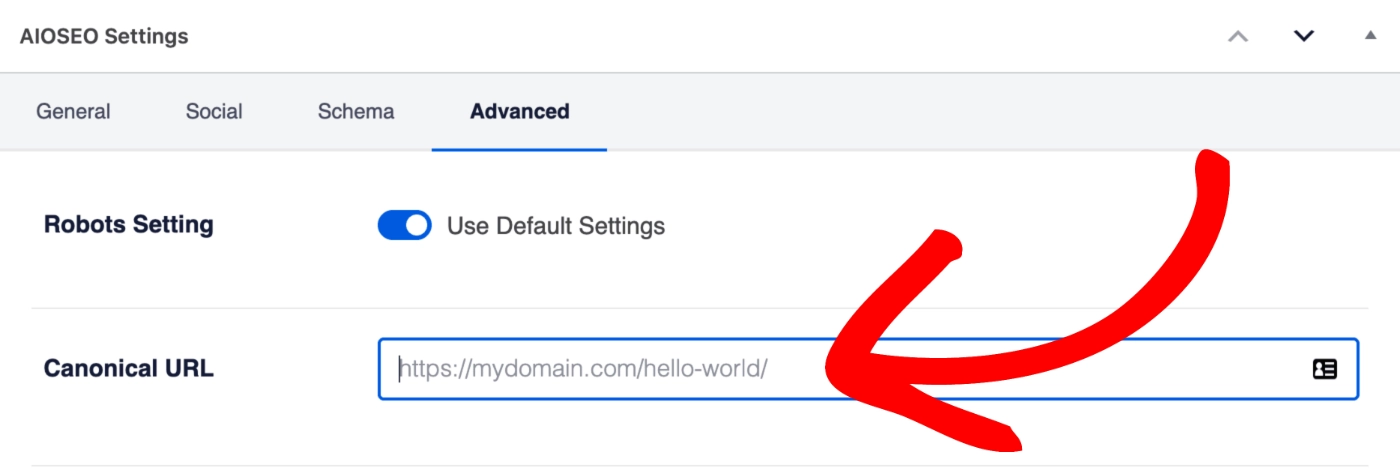
With Yoast SEO, you get two ways to deal with canonical URLs. It automatically adds canonical URLs for most of the pages on your website or WordPress blog. Otherwise, you can also filter the output of the canonical URL of WordPress programmatically.
Noindex tool
The Noindex tool is used in SEO to prevent search engine crawlers from indexing a web page, meaning it won’t appear in search engine results. It’s typically used for pages that aren’t meant to be indexed.
In the case of All in One SEO, Noindex Settings has been replaced by the new Show in Search Results settings under Search Appearance in version 4.x of All in One SEO. The documentation for Noindex settings can be found in Showing or Hiding Your Content in Search Results.
Yoast SEO, on the other hand, comes with a hidden feature due to which the internal search pages of your site are set to noindex by default. This setting is not editable since it follows Google Guidelines. However, if you still want to change it, you can use one of the platform’s filters to do so.
Winner: All in One SEO
In terms of facilitating link management, All in One SEO stands out for its greater number of features and better functionality.
Tracking and analytics
Moving on to the next comparison, let’s discuss tracking and analytics. where we’ll compare two popular tools and see how they differ in their approach.
Insights/analytics dashboard
All in One SEO provides a powerful analytics dashboard that allows you to track key metrics such as organic search traffic, pageviews, bounce rate, and more. You can view data for specific periods and compare metrics to see how your website performs over time.
Additionally, you can use All in One SEO’s analytics dashboard to monitor how your website’s search engine rankings are impacting your traffic and user behavior. In contrast, Yoast SEO analytics does not offer an insights dashboard in its plugin.
While it does provide some basic analytics features, such as tracking search appearance and pageviews directly within the WordPress dashboard, Yoast content analysis remains a primary focus. Therefore, if advanced tracking and analytics features are important to you, All in One SEO may be the better choice.
Rank tracker
Both plugins offer rank-tracking features, but there are some key differences between the two. All in One SEO offers rank tracking for unlimited keywords, while Yoast only allows you to track up to 5 keywords per week with its Wincher integration in the free plan.
Another key difference is that All in One SEO provides detailed reports on your ranking progress, while Yoast only shows your current ranking position. Overall, both plugins offer similar rank-tracking features. However, All in One SEO provides more detailed data and reports, making it the better choice for serious WordPress users who want to monitor their SEO progress closely.
Winner: All in One SEO
Both plugins provide exceptional tracking and analytics features. However, All in One SEO gives you more control over your analytics data.
Integrations
Regarding SEO tools, integrations can make all the difference. You need tools that seamlessly integrate with your existing workflows to get the most out of your SEO efforts. Let’s examine the integration capabilities of these two tools.
Integrations to other SEO tools
Both plugins offer many options regarding integrations with other SEO and analytics tools. All in One SEO integrates with tools such as Google Search Console, Bing Webmaster Tools, Ahrefs, SEMrush, Majestic, Yoast SEO, and Moz, allowing users to analyze, optimize, and monitor their website’s performance with ease.
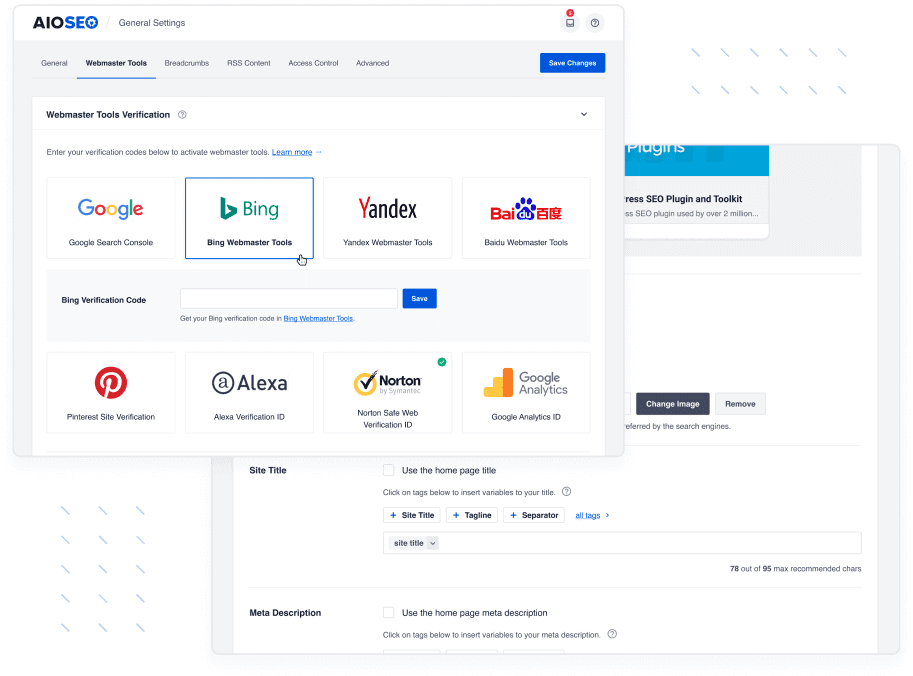
Yoast also provides robust integrations, including Zapier, SEMrush, Wincher, Elementor, ACF fields, Algolia, WordProof, and Jetpack. You can also access Yoast WooCommerce SEO, Easy Digital Downloads, and Mastodon to help users connect their website to various tools and platforms for a comprehensive SEO strategy.
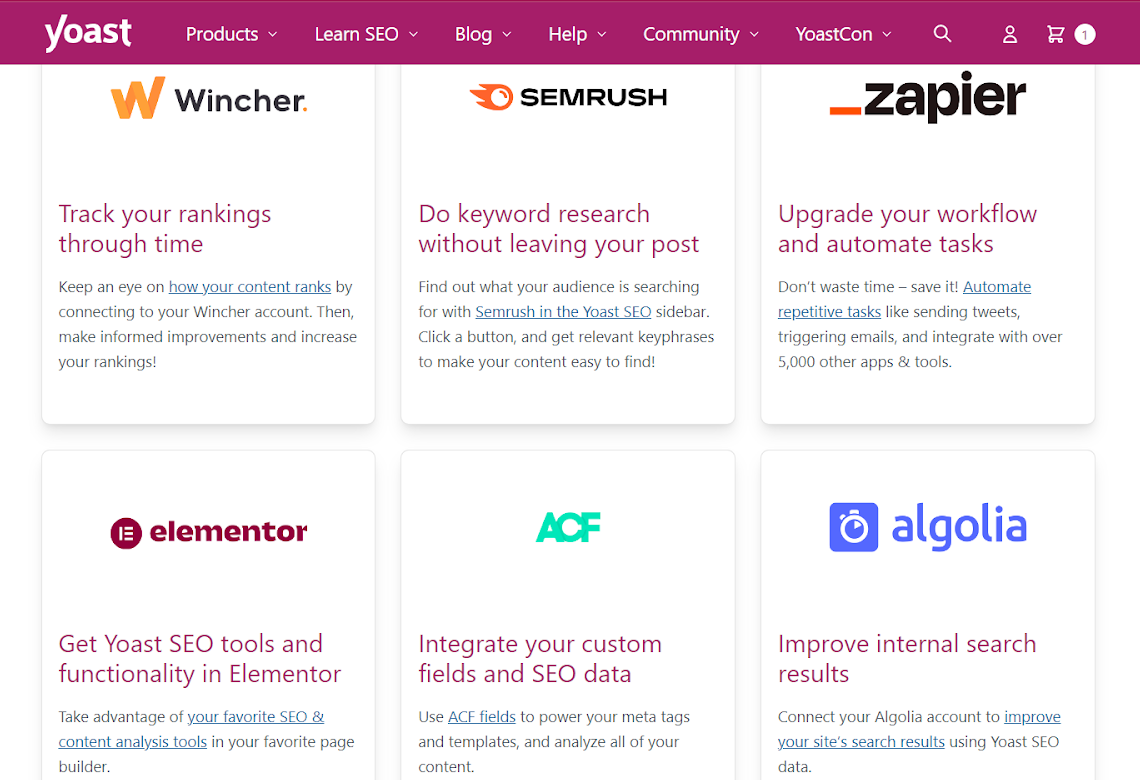
However, Yoast also offers the unique feature of Local SEO support, which can benefit businesses that want to improve their online presence in specific locations.
Integrations to analytics tools
Both All in One SEO and Yoast offer integrations to popular analytics platforms such as Google Analytics, allowing you to track important metrics such as website traffic, user behavior, and conversions. In addition, All in One SEO integrates with popular marketing automation tools like HubSpot and Salesforce, which can be particularly useful for businesses that rely heavily on sales and marketing.
Yoast also offers integration with Google Analytics, which can provide valuable insights into your website’s performance and help you make data-driven decisions about your SEO strategy.
Optimized for WooCommerce
For WordPress users running an e-commerce website with WooCommerce, both plugins offer integrations that optimize your website for search engines and improve the visibility of your products in search results. However, All in One SEO provides a more comprehensive set of features to help you boost your e-commerce SEO efforts.
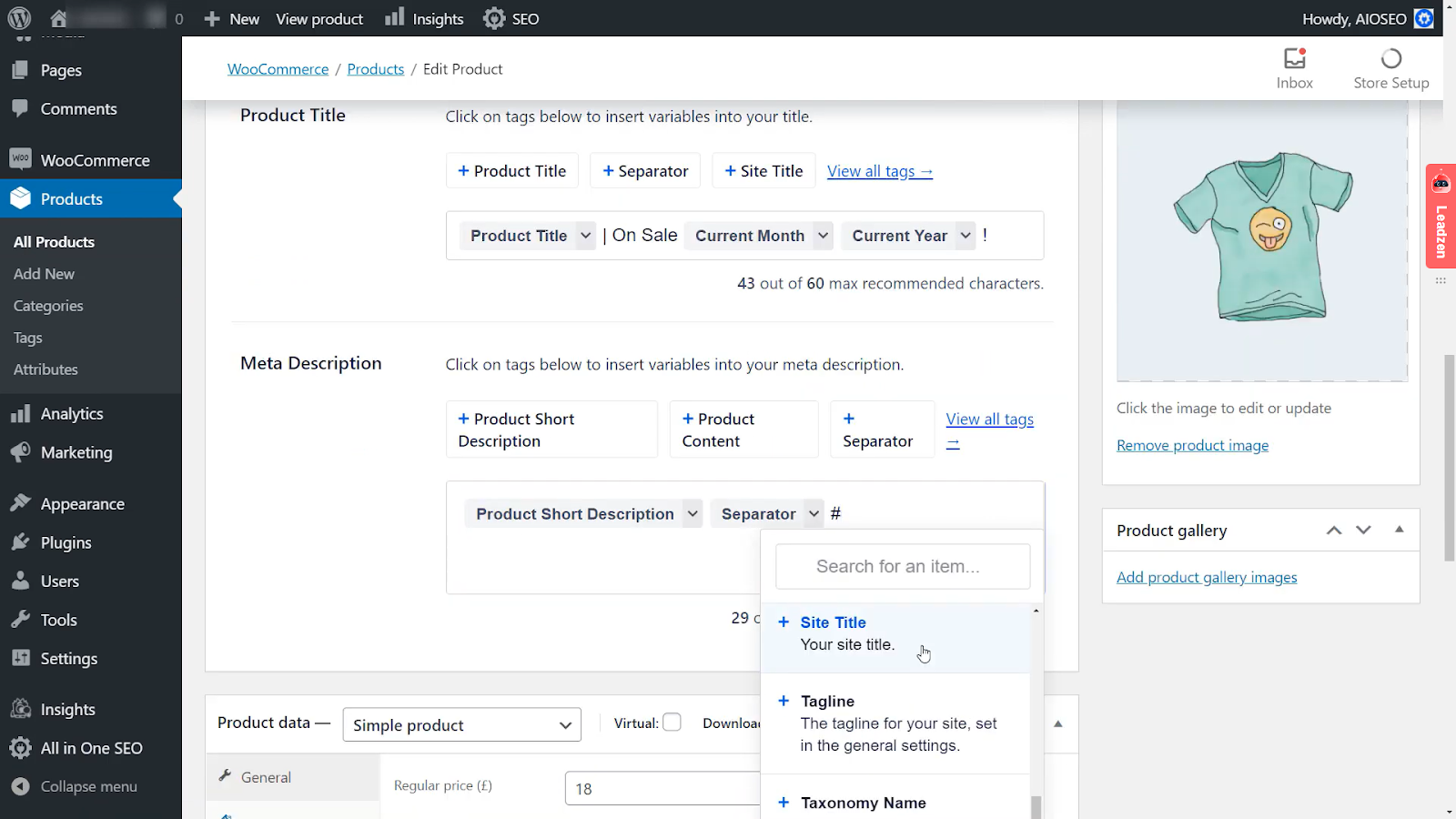
All in One SEO WooCommerce integration includes features such as product schema markup, which helps search engines understand the information on your product pages, and automatic generation of meta tags and titles for your products based on their attributes. This saves you time and effort in optimizing your product pages for search engines.
When comparing All in One SEO vs Yoast, it’s important to note that while Yoast offers some basic SEO features for e-commerce websites, its WooCommerce integration is not as comprehensive as that of All in One SEO. Yoast may be suitable for smaller e-commerce businesses or simpler SEO needs, but All in One SEO’s WooCommerce integration is a better choice for those with more complex requirements.

Local SEO support
When comparing All in One SEO vs Yoast, both plugins support local SEO for local businesses. All in One SEO offers more advanced local SEO features, such as local business schema markup and a local SEO module for optimized local content.
Yoast also offers local SEO support, but its features are more limited than All in One SEO. Its local SEO features include setting your business address and phone number and generating a Google Maps embed code for your website. However, it fails to offer advanced features such as local business Yoast schema markup.
Overall, if local SEO is a key priority for your website, All in One SEO may be the better choice due to its advanced local SEO features and dedicated local SEO module. But if you only need basic local SEO support, Yoast may be sufficient for your needs.
Winner: It’s a Tie!
In our battle of All in One SEO vs Yoast, both plugins provide great integration features, which makes it difficult to determine a clear winner in this aspect. Therefore, it can be considered a tie between the two plugins.
Pricing and value summary: which one is the right choice for you?
When it comes to choosing the right SEO plugin for your WordPress site, both All in One SEO and Yoast are excellent choices. These plugins take much of the guesswork and tedium out of optimizing your content and improving your search engine rankings.
However, if you’re deciding between All in One SEO vs Yoast, it’s important to consider the specific features and functionality each plugin offers.
When it comes to choosing between All in One SEO vs Yoast, both plugins offer impressive features that can enhance your website’s search engine optimization efforts. All in One SEO offers advanced features such as video sitemaps, while Yoast excels in content analysis and readability. Ultimately, it’s up to you to determine which plugin best fits your needs.
FAQ
Can I use Yoast and All in One SEO together?
Does All in One SEO slow down your website more than Yoast?
How do I move from All in One SEO to Yoast SEO?
- Deactivate All in One SEO
- Create a backup of your website
- Go to the Yoast SEO plugin’s “Import from other SEO plugins” page under the “Tools” menu
- Choose “All in One SEO” as the plugin you want to import from and click the “Import” button
- Check that your data is imported and go through the first-time configuration
- Once you’ve confirmed that everything is working properly, click the “Clean” button to remove any leftover data from All in One SEO.
How do I move from Yoast to All in One SEO?
- Go to the All in One SEO plugin and navigate to the “Tools” section.
- Click on “Import/Export” and then select “Import Settings From Other Plugins”.
- Choose “Yoast” as the plugin you want to import from.
- Click on the “Import” button to begin the migration process.
- Once the import is complete, all of your Yoast settings will be migrated to All in One SEO.
Are Yoast or All in One SEO enough to handle all SEO tasks?






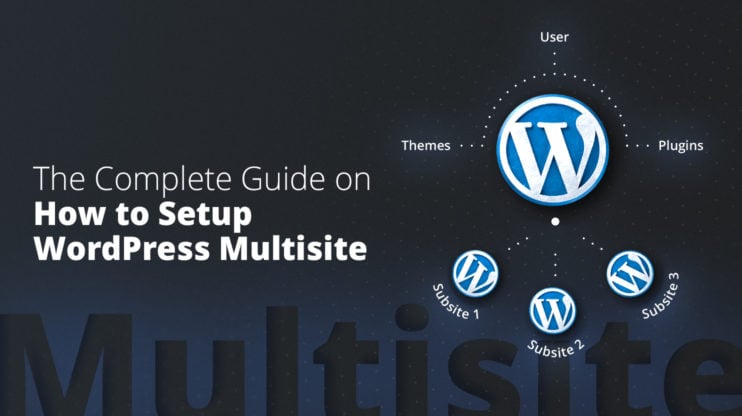
Thanks a lot for the comprehensive analysis and comparision of the plugins. It was exactly what I needed!